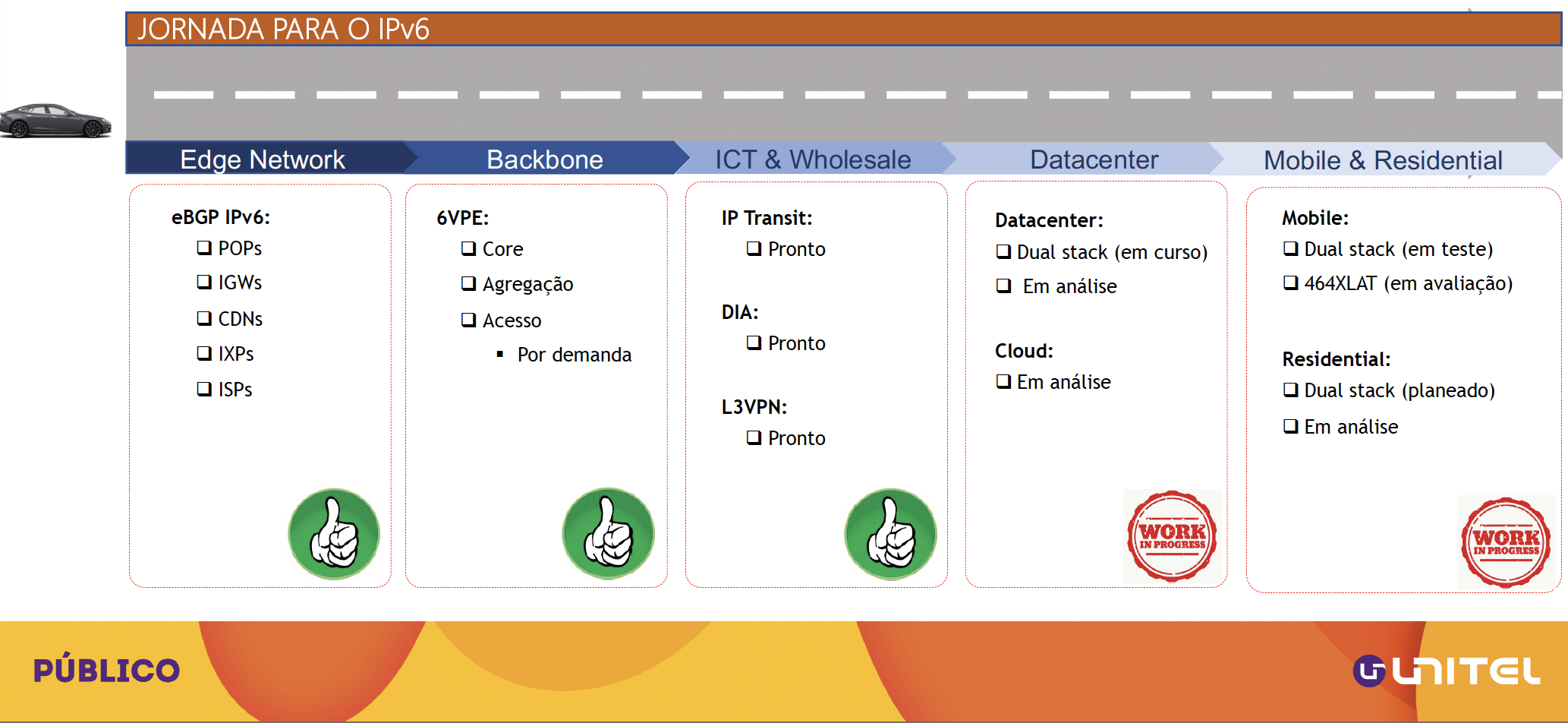 During the 2017 Telecom Forum carried out by Jornal Expansão, Unitel had given guarantees that it was already working on the implementation of IPv6, advancing that the process was gradually taking place in the company's infrastructures. Six years later, Unitel publicly shared how its journey towards implementing IPv6 is progressing during the Angola Peering Forum (AOPF) held from November 9th to 10th under the organization of the Angolan Network Operators Group (AONOG).
During the 2017 Telecom Forum carried out by Jornal Expansão, Unitel had given guarantees that it was already working on the implementation of IPv6, advancing that the process was gradually taking place in the company's infrastructures. Six years later, Unitel publicly shared how its journey towards implementing IPv6 is progressing during the Angola Peering Forum (AOPF) held from November 9th to 10th under the organization of the Angolan Network Operators Group (AONOG).
The presentation made by Walter Ernesto (Service Provider Specialist, Peering Coordinator e IP solution architect) from Unitel, encompassed several technical aspects under the main theme “EDGE NETWORK” Challenges and Recommendations, which addressed a synthesis of the factors that drove the transformation of the edge of Unitel's network, continuous investment in infrastructure to diversify and increase the resilience of the national ecosystem telecommunications, in the medium and long term.
How is Unitel's journey to IPv6?
 From what has been presented, the table above shows that the homework is already being done and that Unitel is in phase 4 and 5 for the implementation of IPv6. At the level of Edge Network, Backbone e ICT & Wholesale is already prepared, and is currently working on the Datacenter and aspects of the Mobile & Residential to implement IPv6 on your network. On this journey, the company also presents the transition methods on the mobile network:
From what has been presented, the table above shows that the homework is already being done and that Unitel is in phase 4 and 5 for the implementation of IPv6. At the level of Edge Network, Backbone e ICT & Wholesale is already prepared, and is currently working on the Datacenter and aspects of the Mobile & Residential to implement IPv6 on your network. On this journey, the company also presents the transition methods on the mobile network:
- Dual Stack (IPv4 and IPv6) – In terms of advantages, it offers simplicity, gradual implementation, does not require NAT64 and maintains the existing IPv4 network. In terms of disadvantages, it requires end-to-end implementation of IPv4 and IPv6, problems with socket APIs and literal IPs, does not solve the IPv4 exhaustion problem, not optimized for the mobile network and IoT.
- 464XLAT - In terms of advantages, it offers the implementation of IPv6 only, supports socket APIs and literal IPs, traffic engineering and QoS, does not require DNS64 and uses the same NAT64 as PLAT, ideal for mobile networks and IoT. In terms of disadvantages, it is limited to TCP, UDP and ICMP, it requires terminals that support CLAT.
Regarding the implementation of IPv6 on the mobile network, there are a large percentage of terminals that do not support CLAT, for confidentiality reasons Unitel cannot share this data. According to Walter Ernesto, alternative methods or a combination of both will be explored to address this need within your network, with the main objective of delivering a high-performance service to the end user.


![[Angola Startup Summit] 2024 Edition with reduction of startups](https://www.menosfios.com/wp-content/uploads/2024/04/Imagem-do-WhatsApp-de-2023-04-27-as-10.44.31-1-218x150.jpg)




